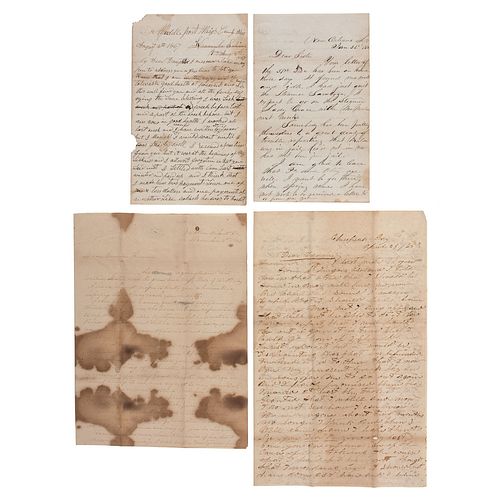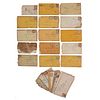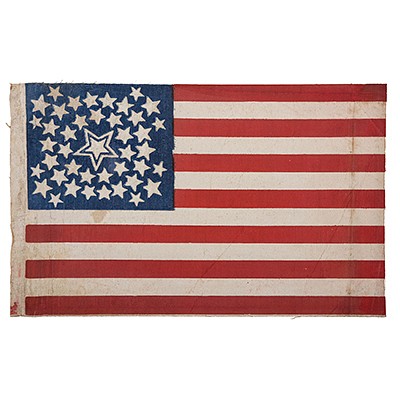Southern Knisley Family Archive, Including Civil War Soldiers' Letters
About Seller
6270 Este Ave.
Cincinnati , OH 45232
United States
With offices in Cincinnati, Cleveland and Denver, Cowan’s holds over 40 auctions each year, with annual sales exceeding $16M. We reach buyers around the globe, and take pride in our reputation for integrity, customer service and great results. A full-service house, Cowan’s Auctions specializes in Am...Read more
Two ways to bid:
- Leave a max absentee bid and the platform will bid on your behalf up to your maximum bid during the live auction.
- Bid live during the auction and your bids will be submitted real-time to the auctioneer.
Bid Increments
| Price | Bid Increment |
|---|---|
| $0 | $25 |
| $500 | $50 |
| $1,000 | $100 |
| $2,000 | $250 |
| $5,000 | $500 |
| $10,000 | $1,000 |
| $20,000 | $2,500 |
| $50,000 | $5,000 |
| $100,000 | $10,000 |
About Auction
Nov 19, 2020
Cowan’s Auctions, a Hindman Company, is pleased to present the November 19 Fall Auction, featuring over 400 lots of historically significant photography, manuscript material, artwork, and other ephemera dating from the 18th through the early 20th century, including the Civil War. Cowan's Auctions dawnie@cowans.com
- Lot Description
Letter archive from the Knisley family of Kanawha, West Virginia, comprising 27 letters, most penned between 1864 and 1867. Most of the correspondence is written by Charles H. Farr to Francis E "Fannie" Knisley (1841-1939), with 15 letters written from Feb. 17, 1864 through August 18, 1866. Also includes 3 letters from the family patriarch Jacob Knisley (b.1799) to his wife Louisiana Vickers Knisley (b.1820) including notes to daughters on 2, as well as a letter written to him by John Vickers, possibly a relation of his wife. Other correspondence includes a letter from Fannie to her sister Lucy M Knisley (b.1848), two letters from sister Mary V. "Mollie" Knisley (b.1845) to Lucy, 1 letter from brother David H. Knisley (b. 1837) to one of the sisters, one from Charles Farr to Mollie, and a letter from a cousin to Fannie. Most are housed in their original postmarked envelopes. Four letters are without envelopes and the archive also includes 15 envelopes not containing letters.
David H. Knisley enlisted with the CSA at the very beginning of the war on May 22, 1861, mustered into Co. K of the 59th Virginia Infantry as a private and was promoted to First Sergt. on by July 25, 1861. He is listed as a POW at Roanoke Island, NC on Feb. 8, 1862, paroled a few weeks later on Feb. 21 at Elizabeth City, NC. He was discharged later that year on June 15, 1862. He seems to have become a river sailor. In a letter to Louisiana on Nov. 12, 1865, David's father Jacob writes: "David is with T.W. Malone on Red Liner on the Steamer Montgomery. He was on the boat when I got to Cincinnati he went with me to the depot." In a letter from David to one of his sisters from New Orleans on January 31, 186?, he writes that he "had just quit the Steamer Saratoga, I expect to go on the Steamer Lady Grace with Mr. Malone next week." He also writes of the marriage prospects for his sisters: "I hope every body in Kanawha will get married while they are at it. I am very much surprised at some of the matches. My compliment and best wishes to Felix and Mary. I care nothing for the others, except Joe."
In a letter to Jacob Knisley from John Vickers written from his home in Clock, MO on Dec. 3, 1866, he writes of his financial losses and continues about his perception of post-war Missouri: "labor has been scarce and high, and I have been forced to labor hard. We have suffered too from the lawlessness of Federal soldiers but much have from the state militia...just citizens hauled off to prison and kept for months without cause or even the semblance of a charge all this and more done in the name of Liberty Oh Liberty the crimes committed in thy name."
In another perspective, Charles Farr writes to Mollie Knisley from Springfield, [Clark Co.], OH on Oct. 11, 1865: "the country is fast filling up with emigrants from the south that is the sadly portion of southern society is coming north in flocks like black birds and I do not know which is the blackest the birds or the niggs. So you see that some of the Preachers can boast of never having a mixed congregation."
Farr writes to Fannie at length apprising her of his health and business, and often writing at length of his affection for her: I wish that I was at your house with you dearest one, I know that you would soon know me well!!" (Sept. 25, 1866 from Davenport, IA). In a letter written at Sea on March 12, 1865, Charles writes to Fannie, mentioning: "I received my discharge I then...registered my forlorn condition. A Charles H. Farr did enlist as a private with the Union on July 6, 1861, mustered into the 1st Ohio Light Artillery on August 6, 1861, mustered out on July 16, 1864. It is unclear if this is the same Farr. Despite their extended and affectionate correspondence, they would never marry. Fannie would marry Thomas F. Holt (1828-1910) on March 5, 1872 and they would have 5 children together. - Shipping Info
-
Buyers are required to pay for all packing, shipping and insurance charges. Overseas duty charges are the responsibility of the successful Bidder. Be aware that for larger and/or valuable items, shipping charges can be substantial. - If there is no shipping amount on listed your invoice, you will need to make arrangements to pick up or ship your purchase through an alternative shipping company. Our shipping department can be contacted at 513.871.1670 (ext. 219) or email shipping@cowans.com. - Shipping charges include insurance for your order while in transit. If you have private insurance we will adjust your charge to include only packing and shipping. - Please allow 14 – 21 days after payment to package and ship your purchase as carefully as possible.
-
- Buyer's Premium



 EUR
EUR CAD
CAD AUD
AUD GBP
GBP MXN
MXN HKD
HKD CNY
CNY MYR
MYR SEK
SEK SGD
SGD CHF
CHF THB
THB












